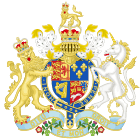Repeal of Act for Securing Dependence of Ireland Act 1782 facts for kids
| Act of Parliament | |

|
|
| Long title | An Act to repeal an Act, made in the Sixth Year of the Reign of His late Majesty King George the First, intituled An Act for the better securing the Dependency of the Kingdom of Ireland upon the Crown of Great Britain. |
|---|---|
| Citation | 22 Geo. 3. c. 53 |
Quick facts for kids Dates |
|
| Royal assent | 21 June 1782 |
| Other legislation | |
| Repeals/revokes | Declaratory Act of 1719 |
| Repealed by | Statute Law Revision Act 1871 |
| Relates to | Irish Appeals Act 1783 |
|
Status: Repealed
|
|
The Repeal Act 1782 was an important law passed by the Parliament of Great Britain. It cancelled an older law from 1719 called the Declaratory Act of 1719. That 1719 law had said that the Parliament of Ireland had to follow the rules made by the British Parliament.
This new Repeal Act was the first step in giving Ireland more control over its own laws. It was part of a set of changes known as the Constitution of 1782.
Contents
Why the Repeal Act Happened
Ireland's Demand for Freedom
The Repeal Act was passed after some big changes in the British government. The previous government had lost the American War of Independence. This defeat showed that people could successfully fight for more freedom.
In Ireland, groups like the Irish Patriot Party and the Irish Volunteers wanted more self-rule. They pushed for Ireland to have its own laws without British interference.
Britain's Response to Irish Demands
The new British government, led by the Rockingham Ministry, was worried. They feared that Ireland might also revolt, just like the American colonies. To avoid this, they agreed to give Ireland more independence.
After the Repeal Act, the Irish Parliament passed its own law called Yelverton's Act. This law changed an older rule called Poynings' Law. Poynings' Law had given the British government the power to check Irish laws before they were even discussed.
What Happened Next
More Steps Towards Independence
Not everyone was happy with just the Repeal Act. A leader named Henry Grattan thought it was enough. But another leader, Henry Flood, wanted Britain to clearly state it had no right to make laws for Ireland.
This extra step was taken with the Irish Appeals Act 1783. This law, also called the "Renunciation Act," made it clear that Britain gave up its right to make laws for Ireland.
Sources
- The original text of the act
 | Mary Eliza Mahoney |
 | Susie King Taylor |
 | Ida Gray |
 | Eliza Ann Grier |

